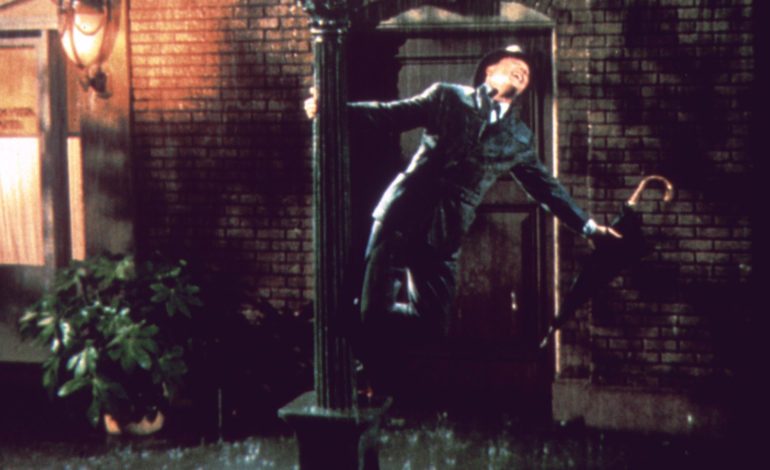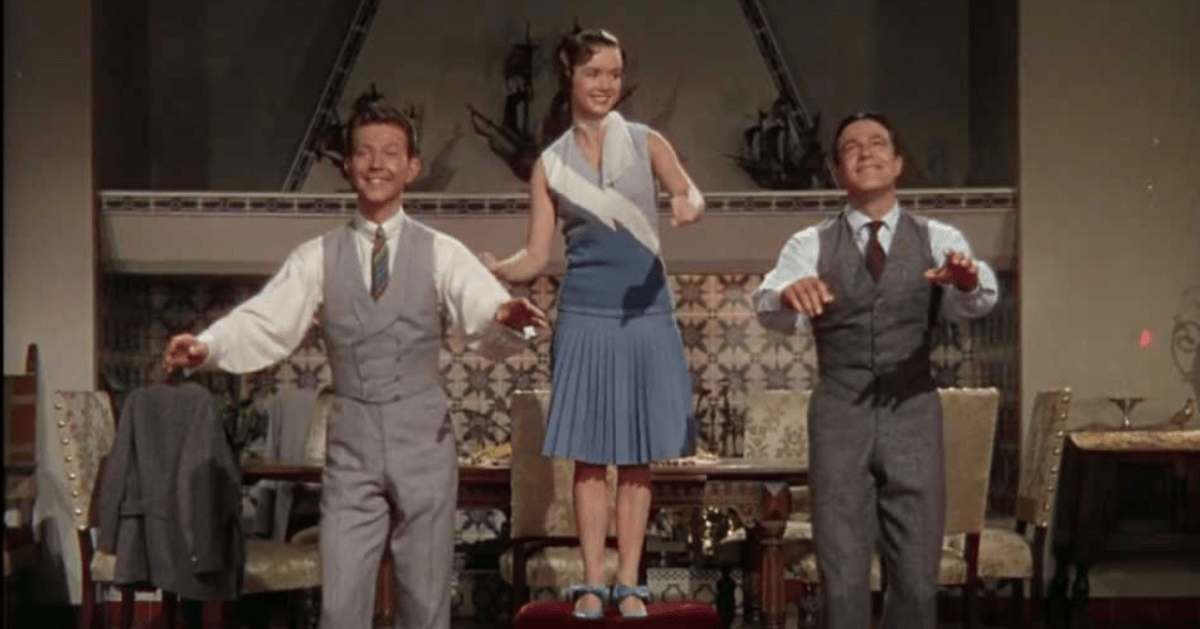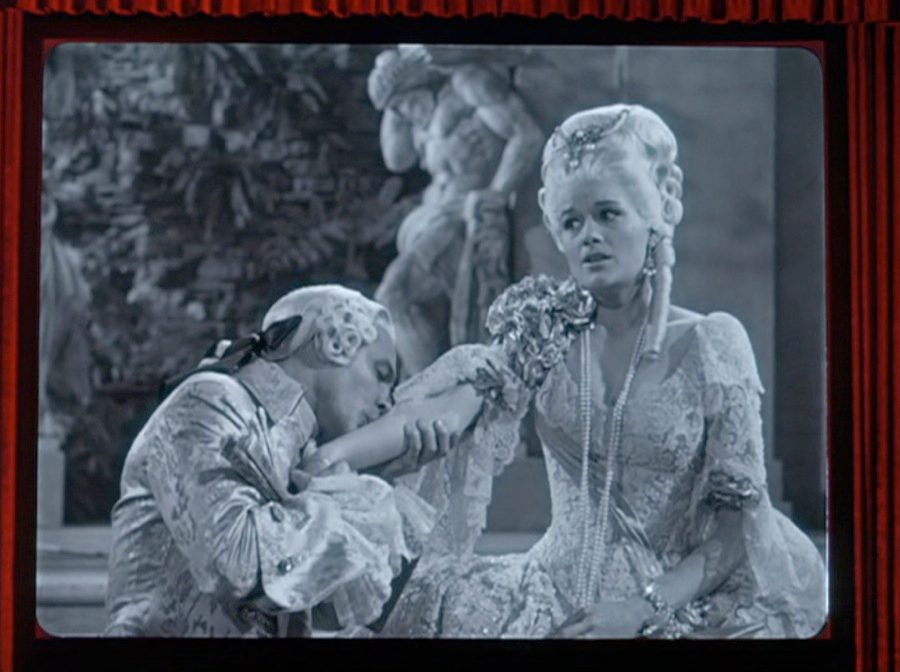

Movie musicals happen to be my favorite genre, unnecessary dance sequences and everything. Likewise, Singin’ In The Rain is easily in my top three musicals of all time, as it helped paved the way for the modern movie musical formula we see today. What I really enjoy about this film is how the songs assist in pushing the plot forward, using the universal nature of music to say much about its character’s aspirations more than their words or actions. Real-life is full of roadblocks, disappointments, and contradictions, so Singin’ In The Rain provides our snapshot into their world. Like real-life, the storytelling is filled with complications and contradictions.
When we first meet Don Lockwood (Gene Kelly), he repeats his motto “dignity, always dignity” in the retelling of his rise to fame. This simple phrase sets the stage for a contradictory approach to narrative storytelling. Don says that he and best friend Cosmo Brown (Donald O’Connor) would perform for his parents’ society friends. In actuality, they were dancing in a pool hall for tips. Don and Cosmo would play their instruments in a bar rather than a conservatory, and they performed at amateur nights, not an academy. The “tour” they went on was not at symphonic halls, but vaudeville and the duo were forced offstage, despite Don describing the audience as loving their act.
Even the way these characters describe the weather is contradictory. They moved to sunny California, yet the flashback shows them arriving in the rain. Ironically, this weather contradiction is referenced in dialogue before the film’s titular and iconic musical number. When Don kisses Kathy Selden (Debbie Reynolds), he says that instead of rain, he sees the sun shining all over the place. Don is happy that they found a way to save their movie, and he gets the girl. The rain represents the roadblocks and the struggles he has with his professional and personal life. “Singing in the Rain” celebrates that, despite the hardships, there is a way to figure out how to save a situation.


Despite finding success as an actor, movies do not come rolling in for Don and Cosmo, and Monumental Pictures is the only studio willing to hire the duo. Rather than take on sophisticated roles, they originally played the mood music on set, and Don eventually was hired as a stuntman, doing every job that came his way even if it was dangerous. We see him go from a cowboy being hurled over a bar to crashing a plane into a building. While Don is depressed about his silent movie profession, Cosmo’s “Make ‘Em Laugh” song puts the bigger goal of their work into perspective: keep doing what the audience wants to see. This theme is put centerstage when the success of The Jazz Singer makes “talkies” a sensation, forcing their studio to adapt into the new era.
This contradictory audio-visual theme is also prolific amongst other members of Hollywood. At one point, a radio host introduces the Hollywood stars as they arrive on the red carpet. While speaking, she describes the opposite of what we see, such as Zelda Zanders (Rita Moreno) recently getting remarried. Zelda, per the radio host, has had unhappiness in her life and hopes that this marriage is true love. Yet we see Zelda and her husband not dragging in depression but rather smiling and happily posing for the cameras, though ironically, her husband seems to be the unhappy one. Later, Olga Mara (Judy Landon) and her husband are introduced with neutral expressions on their face. When the radio announcer introduces them, she explains they have been happily married for two months.
The most notable example of this theme is Lina Lamont (Jean Hagen), Don’s longtime costar, who only became interested when he turned into a leading man. Lina refers to herself as Don’s fiancé, even confirming that she read it in a fan magazine. Yet, their romance is only a façade used for publicity. When he meets Kathy, she doesn’t buy his actor line, putting down his films stating, “if you’ve seen one, you’ve seen them all.” The truth, however, is that Kathy is a fan of Don’s movies and was only acting that way to knock him down a few pegs. Kathy even bumps up her profession, claiming that she’s a stage actress when she’s actually a chorus girl.


Before Don shows up at R.F. Simpson’s (Millard Mitchell) party, Lina is surrounded by men who fight over who gets to light her cigarette. When Don enters the party, Lina asks what took him so long because she was lonely, causing them to get into a fight about Don’s interest in Kathy. Before filming their movie The Dueling Cavalier, the director gives Don direction that he is madly in love with Lina. Since they are filming a silent film, the two hurl insults at one another while filming the scene in a manner that appears visually passionate. The scene is about love, yet they comedically demonstrate the opposite of love while filming.
When R.F. informs the cast that they’re turning The Dueling Cavalier into a talkie, Cosmo assumes he is out of a job as a mood musician, claiming that he will stop suffering and write a symphony. When he is put in charge of the new music department, however, Cosmo restates his lines only this time with a smile and more upbeat attitude. To save The Dueling Cavalier Don, Cosmo and Kathy come up with the idea to turn it into a musical. In the most fantastic display of contradiction, they decide that since Lina can’t sing, dance, or even act without sounding nasally, they will dub Kathy’s voice over Lina’s.
Throughout the film, one of my favorite lines is a snide remark by Lina: “what do you think I am, dumb or something?” This line has more weight than I initially thought watching this film countless times before, as the people surrounding Lina believe that she is dumb. They treat her like she is just another diva with a pretty face. In actuality, Lina is not only smart but conniving as well. When she finds out that the studio was dubbing her voice with Kathy’s, she goes to every newspaper in town with an exclusive interview claiming that the studio is thrilled with her beautiful singing voice. These interviews back the studio into a corner with a contract loophole she took full advantage of, making it harder to push Kathy as the studio’s next star.


In Singing in the Rain’s final moments, Lina gets overzealous and decides she is going to make the speech no one has let her make before. At first, R.F. appears to concede to Lina, making Kathy go behind a curtain to sing while Lina mouths the lyrics, only for he, Don, and Cosmo to literally pull back the curtain and reveal this fraud to the audience. It’s Kathy’s voice they heard and loved, not Lina’s, making a full transition into the era of talkies. By revealing the truth and no longer hiding behind the curtains, Kathy and Don are now allowed to star together in many movies to come.
Often what we see as love is merely a holding place for the true talent behind the scenes. There have been bands that turned out to be lip-syncing to voices that weren’t their own, and singers that don’t write their own songs. The CEO’s get all the credit and praise while the workers are the ones to make it happen. Michael Jordan wouldn’t have been as successful without Scottie Pippen and arguably some of the greatest basketball coaches, yet we all see Jordan as the GOAT. Despite being a movie from the 1950s, Singing in the Rain’s lesson of looking beyond the curtain and not being content with regulating oneself to a stand-in remain just as relevant today. If you are a Kathy, don’t sell yourself short to be hidden for a Lina.
